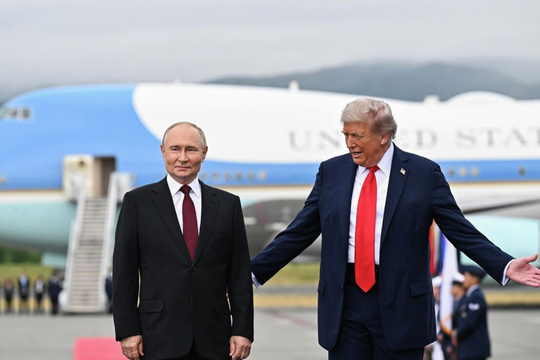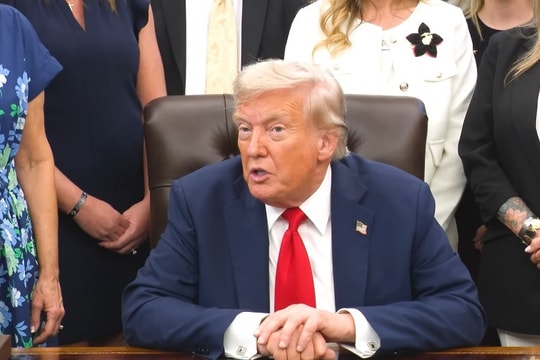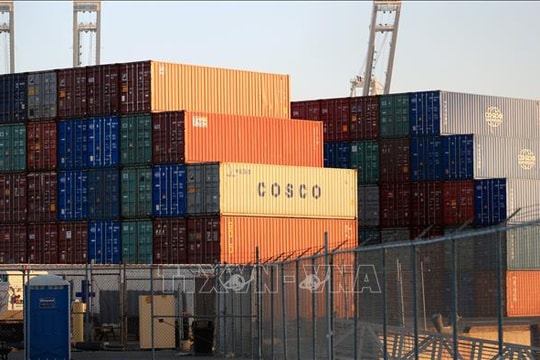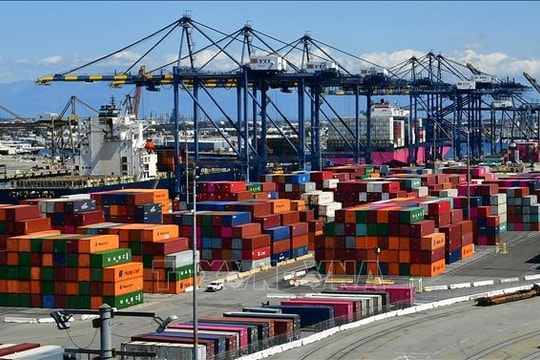Joint Statement on Enhancing the Vietnam - United States Comprehensive Partnership
Full text of Joint Statement on Enhancing the Comprehensive Partnership between the Socialist Republic of Vietnam and the United States of America.
On May 31, 2017, at the White House, Prime Minister of the Socialist Republic of Vietnam Nguyen Xuan Phuc held talks with President of the United States of America Donald J. Trump to outline a roadmap for Vietnam-US relations, based on the positive momentum of the Comprehensive Partnership between the two countries.
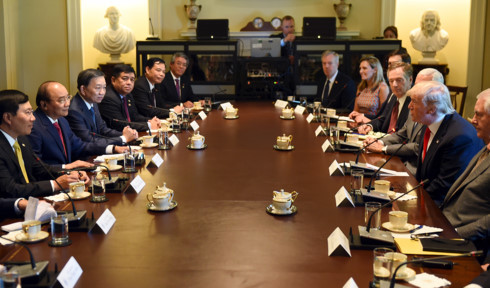 |
| Scene of the Vietnam-US high-level talks. Photo: Quang Hieu |
As a Pacific power with interests and commitments throughout the Asia-Pacific, the United States shares many important interests with Vietnam. The two leaders emphasized that there are many opportunities opening up in the Vietnam-US relationship, in which political, diplomatic, economic and trade relations are increasingly strengthened; cooperation is increasing in the fields of science - technology, defense - security, education, people-to-people exchange, humanitarian and war legacy issues, as well as regional and international issues of mutual concern.
The two leaders agreed to promote the above opportunities through strengthening the Comprehensive Partnership based on respect for the United Nations Charter and international law, and respect for each other's independence, sovereignty, territorial integrity and political systems.
The two sides agreed to continue high-level contacts and delegation exchanges, including regular dialogues between the Vietnamese Foreign Minister and the US Secretary of State, to discuss measures to enhance the Comprehensive Partnership between the two countries. The two sides also agreed to promote existing dialogue mechanisms, including Party-to-party relations. President Trump expressed his support for Vietnam in successfully hosting the APEC 2017 and said he looked forward to visiting Vietnam and attending the APEC Summit in November.
The two leaders pledged to actively strengthen the mutually beneficial and increasingly growing economic relationship, contributing to promoting prosperity for both countries. The two leaders affirmed their continued support for development cooperation between the two countries. Prime Minister Nguyen Xuan Phuc affirmed that Vietnam consistently implements the policy of economic reform and international integration, creating favorable conditions for foreign companies, including US companies, to do business and invest in Vietnam; enforce and protect intellectual property; and perfect labor laws in accordance with Vietnam's international commitments.
The two sides affirmed the importance of promoting bilateral trade and creating a favorable environment for businesses of both sides, especially through the effective implementation of the Trade and Investment Framework Agreement to handle issues in Vietnam-US relations in a constructive spirit.
The two leaders welcomed the resolution of several priority trade issues, including telephone roaming services and veterinary drugs, and pledged to continue to work constructively to address other priority issues of each side, such as intellectual property, financial and advertising services, information security products, white offal, distillers' grains, catfish, shrimp, mangoes and other issues.
The United States noted Vietnam’s interest in achieving market economy status and the two sides agreed to continue consultations in a cooperative and comprehensive manner through the strengthening of the bilateral working group. Both sides welcomed the announcement of new trade agreements totaling more than $8 billion.
The two leaders agreed to strengthen bilateral defense relations based on the 2011 Memorandum of Understanding on Advancing Bilateral Defense Cooperation and the 2015 Joint Vision Statement on Defense Relations. The two leaders discussed the recent decision by the U.S. Government to transfer a Hamilton-class patrol boat to Vietnam to enhance Vietnam’s maritime law enforcement capabilities, and Prime Minister Nguyen Xuan Phuc expressed interest in acquiring additional defense equipment from the United States, including patrol boats for the Coast Guard.
The two leaders also discussed measures to expand cooperation in priority areas such as humanitarian cooperation, addressing war legacy issues, and maritime security. The two leaders discussed the possibility of a US aircraft carrier visiting a Vietnamese port and measures to further enhance cooperation between the two navies. The two leaders welcomed the signing of the Memorandum of Understanding on the establishment of a working group on the Cooperative Initiative for Medical Storage and Humanitarian Cooperation and agreed to expeditiously implement the agreement.
The two leaders agreed to strengthen cooperation in security and intelligence. Vietnam and the United States committed to cooperating in combating terrorism, transnational crime and cybercrime. Prime Minister Nguyen Xuan Phuc highly appreciated and hoped that the United States would cooperate and support Vietnam in the field of UN peacekeeping, including providing equipment and supporting the participation of Vietnamese officers in UN peacekeeping operations.
The two leaders agreed to expand cooperation in the fields of science, technology, space, and innovation. They expressed their support for the Framework Agreement on Cooperation in the Peaceful Uses of Outer Space, as well as bilateral exchanges and forums on science, technology, and innovation.
The two leaders welcomed the growth of people-to-people ties, particularly through academic and professional exchange programs. They recognized the important contributions to bilateral relations made by the Vietnamese community in the United States and the nearly 4,000 alumni of educational exchange programs.
The two sides also noted that, with more than 21,000 Vietnamese students studying in university programs in the United States, the academic relationship between the two countries is growing strongly and will be enhanced through Vietnam's support for the opening of Fulbright University in Ho Chi Minh City.
The United States welcomes more Vietnamese students to study in the United States and remains committed to issuing visas promptly, including student visas, in accordance with U.S. law. Both sides also welcomed the establishment of the Peace Corps Program to promote English language learning in Vietnam.
The two sides pledged to cooperate to address war legacy issues, including mine clearance and dioxin remediation; noted progress in dioxin remediation at Da Nang Airport, and discussed next steps for joint remediation at Bien Hoa Airport. President Trump expressed appreciation for Vietnam’s continued cooperation in humanitarian efforts to account for Americans missing in action from the war, and pledged to cooperate with Vietnam in its efforts to locate Vietnamese soldiers.
Prime Minister Nguyen Xuan Phuc affirmed that Vietnam will work actively with the United States to soon return Vietnamese citizens who have received final orders to leave the United States, based on the 2008 Vietnam-US Agreement on the Acceptance of Return of Citizens. The two leaders pledged to establish a working group to discuss this issue.
The two sides agreed to work actively together to finalize an agreement on the selection of a suitable site and land lease agreement for the new headquarters of the U.S. Embassy in Hanoi. The United States pledged to support Vietnam in acquiring new headquarters for Vietnamese representative agencies in the United States.
President Trump and Prime Minister Nguyen Xuan Phuc welcomed the results of frank and constructive dialogue on human rights, particularly the 21st round of the U.S.-Vietnam Human Rights Dialogue held in May 2017, to narrow differences and continue to build trust. The two leaders emphasized the importance of protecting and promoting human rights and the interconnectedness between human rights and the security and sustainable development of each country.
The two countries encourage enhanced cooperation to ensure that all people, including members of vulnerable groups, regardless of their gender, race, religion, or sexual orientation, and persons with disabilities, fully enjoy their human rights. The United States welcomes Vietnam’s efforts to improve its legal system to protect and promote the rights of all people.
On regional issues, the two leaders expressed concern over the DPRK's nuclear and ballistic missile tests, which violate UN Security Council resolutions and increase tensions in the region. The two sides reaffirmed their support for the denuclearization of the Korean Peninsula, and urged all parties concerned to strictly implement relevant UN Security Council resolutions.
President Trump and Prime Minister Nguyen Xuan Phuc affirmed that the South China Sea is a waterway of strategic importance to the international community. The two leaders emphasized the importance of ensuring freedom of navigation and overflight, and other lawful uses of the seas; and expressed concern about the destabilizing impact that unlawful restrictions to the freedom of the seas have on peace and prosperity in the Asia-Pacific region.
The two sides also affirmed their full support for the peaceful resolution of disputes, without the threat or use of force, in accordance with international law, including full respect for diplomatic and legal processes, and called on all parties concerned to strictly implement their international legal obligations in the process of resolving disputes. The two leaders stressed the need for parties to exercise restraint and refrain from actions that could increase tensions, such as militarizing disputed features. President Trump emphasized that the United States will continue to sail and operate wherever international law allows.
The two sides affirmed to continue implementing the common principles agreed upon by the ASEAN and US leaders in the 2016 Sunnylands Declaration, and promoting activities to celebrate the 50th anniversary of ASEAN and the 40th anniversary of ASEAN-US relations. The US committed to strengthening the ASEAN-US Strategic Partnership, supporting joint efforts to build a rules-based ASEAN Community, and supporting ASEAN’s central role in the evolving regional architecture.
The two countries pledged to continue to cooperate to address global challenges, including environmental protection, global health, global health security, and combating human and wildlife trafficking. The United States supports Vietnam in developing a national laboratory to enhance its capacity to detect emerging disease threats in the region. The two countries affirmed their strong support for the Global Health Security Agenda (GHSA) to prevent, detect, and respond to threats from infectious diseases.
The two countries also affirmed their long-standing partnership under the President’s Emergency Plan for AIDS Relief. As a development partner of the Mekong River Commission and a founding member of the Lower Mekong Initiative, the United States reaffirmed its support for cooperation among MRC members, as well as between MRC members and other regional mechanisms, in the effective and sustainable use, management, and development of transboundary water resources. The United States affirmed its support for Vietnam in responding to climate change through specific mitigation and adaptation measures.
The two leaders opened up a bright future for the enhanced Comprehensive Partnership; agreed to promote this relationship more deeply, substantially and effectively, for the benefit of the people of the two countries, as well as for peace, stability, cooperation and development in Asia-Pacific and the world./.
According to VOV
| RELATED NEWS |
|---|


